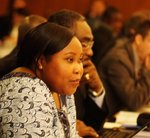Sylvie BECKY
contribution 07 -
BECKY Sylvie

transtlated version
Thank you, Professor Sorel.
I am Sylvie Becky. I am in charge of the section of Witness and Victims Support at the ICTR. Our prime duty is to ensure the production of witnesses to Arusha or to the Hague for the purposes of their testimony before the Court or Tribunal. And that dispatch is done with states’ cooperation. As you are aware, the Tribunal does not have a territory of its own. We have an agreement with the host country, namely, Tanzania, which supports us very much in our work.
But those witnesses reside in different countries, including Rwanda. To bring them to Arusha, these witnesses have various statuses. Some of them are residents, some of them are nationals in their countries of residence, for instance, those living in Rwanda. But you have others who have sought refuge in other countries, and many more do not have any legal status in their countries of residence.
So the prime issue is to bring them to Arusha and to take them back to their countries of residence. So we have the specific case of clandestine citizens or residents who have no registration with the state entities of their countries of residence. What we have been able to achieve with the support of states under the cooperation agreements, we obtain travel documents for those witnesses to enable the move of their countries of residence to Arusha and to take them back irrespective of their immigrational status. We have brought eight witnesses who are asylum seekers and who normally are not allowed to leave their new countries of residence without interrupting their asylum case or applications.
These, therefore, are some of the achievements, the successes we have registered. We have also established a number of measures or a mechanism for witnesses living alone or living with their parents, single parents, without impeding into the livelihoods of their family members. It is important at this stage to pay tribute to those more than 2,000 persons who have made it to Arusha for the purposes of testifying. We are all aware that it is not easy to recall events which were terrible, which scarred us so badly, but witnesses do so in the interest of justice.
Among the witnesses we have victims. We do have witnesses who were sexually abused, witnesses who lost family members but who, notwithstanding, still accept to help justice in its work.
We also have expert witnesses who are compensated for the services provided to the Court. We also have detained witnesses or detainee witnesses. These are persons who are in detention in their countries or persons who have been detained by the Tribunal and are serving their sentences in various countries. All of these persons are sent to Arusha to ease the work of the Judges, because without the witnesses, apart from documentary evidence, I wonder what would happen in courts, hence the prime role of the witnesses in court.
We have the responsibility of providing not only support to the witnesses, administrative, judicial, medical, psychological support, but we also have the duty to ensure their security. One of the major challenges is that we do not have total control over these persons who come from all over to testify in Arusha and return to their countries of residence. We have the main office in Arusha and a sub office in Kigali, hence the constraint or constraining our operations. But that has not barred us from establishing a relationship of trust, because over the years we have had witnesses who have come back and forth to testify in various trials.
Some of the witnesses who were considered as vulnerable, upon a security risk assessment, were relocated internally, which means moving within the same country. And with the support, once again, of states, other witnesses, through some special UN programmes or other agency programmes, were relocated to other countries where security conditions were much more sound to keep them from harms way. And that much I can report about witnesses.
Let me also lay emphasis on the issuing of travel documents. I remember that previously we had been we had come under attack by some parties on the ground that some countries knew that witnesses will travel to Arusha. When dealing with states cooperation with states, we should bear in mind the sovereignty of states. You cannot issue a travel document which will be null and void in another country of transit for the witness. You have a witness travelling from country X who has to transit through two or three countries before getting to country Y, hence, the import of obtaining a travel document that will be recognised by all the countries until the witnesses’s final destination.
We have witnesses who have come from Rwanda, and like all other countries, we entered we made contact with the authorities. We have resource persons in the various governments who do everything to cut down on the red tape so that they could expeditiously issue those travel documents and enable the witnesses to travel and bear testimony before the Courts.
Of course, there are witnesses who cannot go unnoticed. So we have to give pseudonyms to governments so that a travel document is issued. And we always have contact persons with governments and that obtains across the board.
J.M. SOREL
Thank you for this very interesting contribution. I am not going to open a Pandora’s box in respect of alpha witnesses and detainee witnesses. I think that we also have confusion of testimonies. But before that, I have a little paper stating that Ms. Dior Fall and Mr. Stewart are willing to take the floor.

